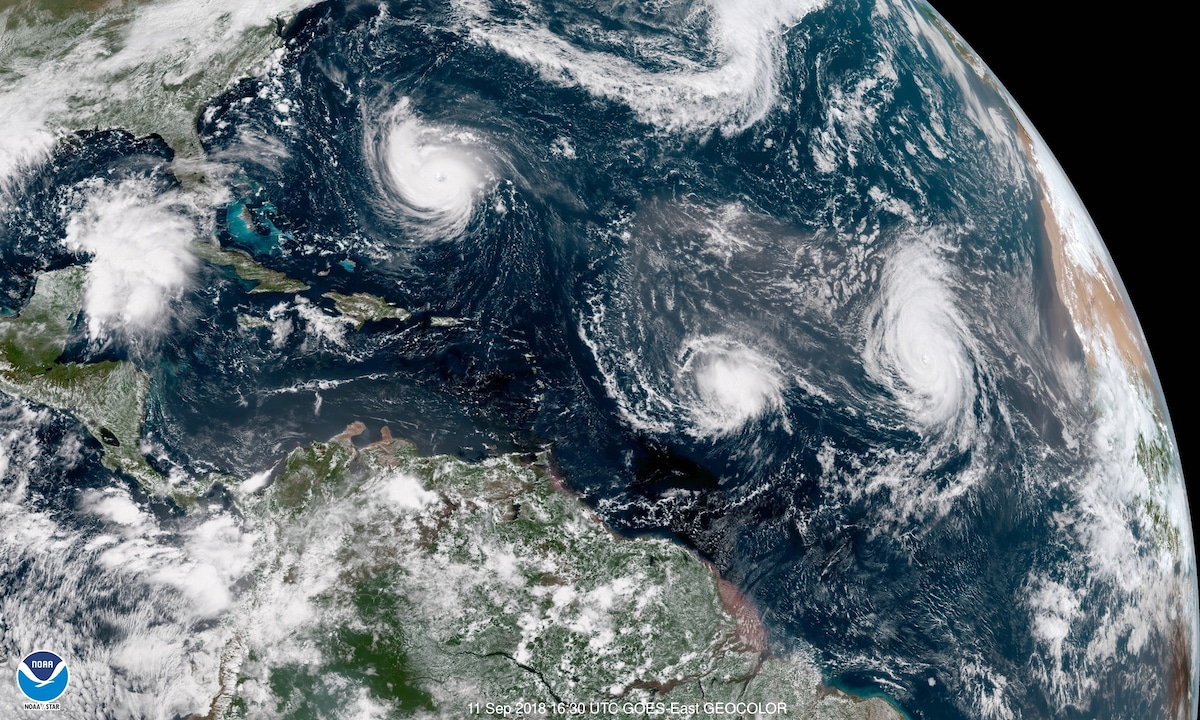Back-to-Back Hurricanes Are Already More Likely, but the Chances Will Surge as the Climate Warms

 Why you can trust us
Why you can trust us
Founded in 2005 as an Ohio-based environmental newspaper, EcoWatch is a digital platform dedicated to publishing quality, science-based content on environmental issues, causes, and solutions.
In October of 2020, the town of Lake Charles, Louisiana, was in the process of recovering from Hurricane Laura, a Category 4 storm that had damaged nearly every structure in the town six weeks earlier.
Then Category 2 Hurricane Delta bore down, flooding several of the already damaged buildings.
“Add Laura and Delta together and it’s just absolutely unprecedented and catastrophic,” Lake Charles Mayor Nic Hunter told The Associated Press at the time.
But while its mayor called Lake Charles’s experience “unprecedented,” back-to-back tropical storms are becoming increasingly likely in the U.S. and could become even more frequent along the U.S. Gulf and East Coasts as global temperatures continue to climb. That’s the conclusion of a new study published in Nature Climate Change Monday that offers yet another warning for vulnerable regions as they adapt to the climate crisis.
“Rising sea levels and climate change make sequential damaging hurricanes more likely as the century progresses,” lead author and postdoctoral researcher at Princeton University Dazhi Xi said in a press release. “Today’s extremely rare events will become far more frequent.”
One hurricane striking an area is bad enough, but when another strong storm follows in quick succession, it can compound the impacts of the first. For example, when a weakened Hurricane Nicholas passed over Louisiana as a tropical depression on September 15, 2021, the ground was already sodden from the Category 4 Hurricane Ida around 15 days before, leading the weaker storm to have worse consequences than it would have on its own, as the study authors noted.
The researchers first decided to investigate whether this was truly happening more frequently in 2017, when Hurricanes Harvey, Irma and Maria all struck, according to the press release.
“Sequential hurricane hazards are happening already, so we felt they should be studied,” research leader and Princeton associate professor of civil and environmental engineering Ning Lin said in the press release. “There has been an increasing trend in recent decades.”
First, the team looked at whether sequential tropical storms were really on the rise. Because there weren’t enough actual storms since reliable record-keeping began around 1950, the researchers used computer simulations to round out the data, AP News explained. They found that the risk of back-to-back storms had increased in seven out of nine coastal locations studied between 1949 and 2018, according to the study. The risk is still low — the highest likelihood they found was still less than 10 percent for storms within 30 days of each other — but in Sandy Hook, New Jersey, the risk had still doubled over the study period.
When it comes to the future, however, the risk could get much higher. The study authors next considered what would happen to the chance of back-to-back tropical storms under a high and moderate emission climate scenario. In both cases, the risk of two tropical storms striking within 15 days along the Gulf or East Coast went up significantly by 2100, from every 10-to-92 years to every one-to-two years in the worst-case scenario and every one-to-three years in the moderate one.
“For people in harm’s way this is very bad news,” University of Albany hurricane scientist Kristen Corbosiero, who did not participate in the study, told AP News. “We (scientists) have been warning about the increase in heavy rain and significant storm surges with landfalling TCs (tropical cyclones) in a warming climate and the results of this study show this is the case.”
The main reasons for the increase in risk are that sea level rise makes storm surges more impactful and warmer temperatures lead to more intense, wetter storms.
The scientists said that policy makers should take their findings into account when drafting recovery plans and improving infrastructure in at-risk areas, according to the press release.
“If a power system requires 15 days to recover from a major hurricane, we cannot wait that long in the future because the next storm can hit before you can restore power, as in the case of Nicholas following Ida,” Lin said in the release. “We need to think about plans, rescue workers, resources. How will we plan for this?”
Subscribe to get exclusive updates in our daily newsletter!
By signing up, you agree to the Terms of Use and Privacy Policy & to receive electronic communications from EcoWatch Media Group, which may include marketing promotions, advertisements and sponsored content.

 233k
233k  41k
41k  Subscribe
Subscribe 




